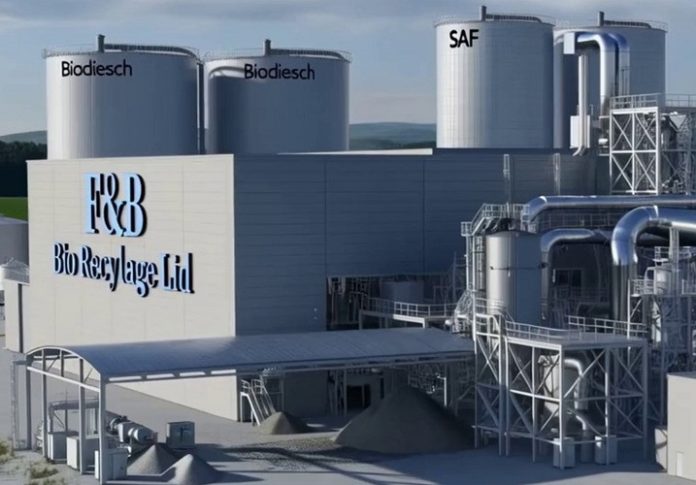F&B Bio Recyclage Ltd, an innovative recycling Start-up producer announced the successful completion of Phase 1 of groundbreaking 2000 tons per day Municipal solid waste conversion facility in Ghana. Company’s innovative project represents a significant advancement in sustainable fuel production, combining state-of-the-art gasification and Fischer-Tropsch technologies to transform municipal solid waste into high-value sustainable aviation fuel (SAF) and biodiesel. This milestone marks a significant step forward in our mission to deliver a scalable, commercially viable, and environmentally sustainable solution to urban waste challenges while contributing to global decarbonization goals.
The Phase 1 has provided a strong foundation, confirming the technical and commercial viability of the project, identifying key risks and opportunities, and outlining a clear development path forward, with a key focus on design optimization, technical & commercial feasibility, preliminary engineering, and high-level financial cost estimation. This phase has established the technical foundation for a commercial-scale operation capable of processing 2000 tons of solid waste daily while producing sustainable transportation fuels that meet international aviation and automotive standards.
The Phase 1 Roadmap included: 1. Project Definition & Scoping
⦁ Define project objectives, scope, governance.
⦁ Set up project team and steering committee.
⦁ Identify and engage initial stakeholders.
- Technology Selection & Partner Engagement
⦁ Finalize technology licensors (gasification, FT, upgrading).
⦁ Agreements signed with technology licensors
⦁ Integration workshops with licensors. - Site Identification
⦁ Evaluate sites (Tema Industrial Enclave shortlisted).
⦁ Conduct site assessments (utilities, logistics, geotechnical).
⦁ land purchase/lease investigated - Feedstock Assessment
⦁ Assess municipal solid waste availability & composition.
⦁ Preprocessing/drying design (50% → 20% moisture).
⦁ Investigated supply agreements with municipalities/operators. - FEL 1 Studies completed
⦁ Completed by our technology licensors & EPC Partner
⦁ Consolidate FEL 1 into integrated technical-economic report.
⦁ Deliverable: CAPEX/OPEX ranges, mass-energy balances, preliminary PFDs. - Market & Offtake Assessment
⦁ SAF offtake discussions with airlines/fuel traders.
⦁ Co-product analysis (naphtha, diesel, power).
⦁ ASTM D7566 & ICAO/CORSIA compliance planning. - Environmental & Permitting Preparation
⦁ Baseline environmental & social studies (ESIA).
⦁ Begin permitting dialogues with regulators.
⦁ Identify sustainability compliance needs (GHG, certifications). - Financial & Commercial Structuring
⦁ Develop preliminary financial model (linked to FEL 1 outputs).
⦁ Explore financing (equity, debt, grants, climate funds).
⦁ Identify financial advisors and lending institutions. - Stakeholder Engagement
⦁ Engage government agencies, municipalities, and community.
⦁ Develop local content & employment strategy.
⦁ Build communications/public relations framework - Transition to Pre-FEED
⦁ To announce EPC partner (Q4 of Phase 1).
⦁ Issue Request for Proposals (RFPs) for Pre-FEED studies.
⦁ Align project partners on Pre-FEED scope, schedule, and deliverables.
⦁ To secure funding commitment for Pre-FEED and FEED phases.
‘’This project stands at the crossroads of two global challenges—waste management and decarbonization of transportation. Our Phase-1 completion confirms that we can turn trash into clean jet fuel at scale in Ghana 🇬🇭, with measurable environmental and economic impact,” said Mr. Frederick Opoku Agyekum, Project Development Director of F&B Bio Recyclage Ltd.
The project has already attracted strong interest from international SAF off takers, infrastructure investors, and development finance institutions due to its replicable model, positive carbon intensity profile, and scalability across emerging and developed markets alike. In addition, we have established strong partnerships with local governments, waste management authorities, as well as leading technology and engineering partners to ensure smooth project implementation. These collaborations position us to deliver the project effectively, while creating both economic and environmental value.
Technology and Process The project leverages state-of-the-art gasification technology to convert solid waste—such as municipal solid waste or industrial residues—into syngas, a mixture of carbon monoxide and hydrogen. This syngas is then processed through Fischer-Tropsch synthesis, a proven catalytic process developed in the 1920s and refined over decades, to produce liquid hydrocarbons suitable for use as SAF and biodiesel. These fuels offer a sustainable alternative to conventional fossil fuels, with the potential to reduce lifecycle greenhouse gas emissions by up to 90% compared to traditional petroleum-based fuels.
The Fischer-Tropsch process is particularly well-suited for this application due to its ability to produce high-quality fuels from diverse feedstocks, including biomass and solid waste. Recent advancements in catalyst formulations and reactor designs have further improved the efficiency and scalability of this technology, making it a cornerstone of modern biofuel production.
Technical Specifications
⦁ Capacity: 2,000 tons per day of solid waste with 50% initial moisture content from source (households), reduced to 20% moisture content after drying.
⦁ Technology: Integrated gasification and Fischer-Tropsch synthesis
⦁ Products: Sustainable Aviation Fuel (SAF) and biodiesel meeting ASTM D7566 & ASTM D975 specifications
⦁ Efficiency: Optimized energy recovery and product yield
⦁ Final Output: 2000 bbl/d (SAF & Bio diesel)
Next Steps With Phase 1 successfully completed, we are now advancing to Phase 2, which will focus on:
⦁ Detailed engineering and procurement activities
⦁ Environmental permitting and regulatory approvals
⦁ Construction planning and contractor selection
⦁ Financial close and project financing completion
Company said that we are currently receiving proposals for Phase 2 from qualified engineering firms and technology partners, to progress toward the Front-End Engineering Design (PRE-FEED) phase. This will be followed by a comprehensive FEED (FEL-3) phase, culminating in the Final Investment Decision (FID) and the commencement of Construction.
Strategic Importance & Circular Economy Impact This project is a model for the circular economy in action, where society’s waste becomes a valuable energy resource. By integrating advanced recycling with clean fuel production, F&B is contributing to:
⦁ GHG emissions reductions through diversion of waste from landfills and fossil fuel displacement,
⦁ Energy security through local production of clean fuels,
⦁ Job creation in high-tech, clean energy sectors,
⦁ Sustainable urban development through responsible waste management.















